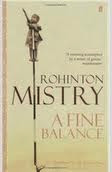
I chose to read A FINE BALANCE in part because it had been recommended to me, and in part because it was reviewed as “sweeping and Dickensian”. I love a good Victorian treatment of a contemporary subject, and the subject here was at least in part Partition. I have little/no understanding of the history or politics of Partition, but I know its literature well, being a veteran of such authors as Vikram Seth, VS Naipaul, etc, and as a purely literary event I always find Partition very compelling, and weirdly modern: all these people suddenly cut a drift from their regular lives, and having to start again.
A FINE BALANCE tells the story of four people who all end up living in a small flat together. There’s the owner, a single lady of mature years; the two tailors she employs; and her paid guest, who is the child of a school friend. We move back and forth in time, hearing the story of each person, but the centre of the novel is the time in the flat. The co-habitation in the flat begins out of economic necessity, but over time the four develop into a little family, which is very sweet and touching.
Hold up there, because here is where I started to get suspicious. Why are they so happy? Why are so many threads resolved, and I’m only at about 70%? I HOPE MISTRY ISN’T SETTING ME UP TO CARE ABOUT THESE PEOPLE JUST SO HE CAN MAKE A POINT ABOUT INDIA’S SOCIAL ILLS, IS HE? Oh yes. Oh yes he is. He makes you care about the characters so that when they run into the above social ills, you feel terrible. And he sure lays on the ills/ These four characters experience:
– Caste violence
– Rape
– Slum dwelling
– Slum clearance (ie, you think slum dwelling is bad, but it’s nowhere near so bad as when they won’t let you live in the slum)
– Forced sterilization
– Forced labour
– Religious mob violence
I mean, I’m not playing: this is all in there. And it’s not even that long. At the end, one kills himself, and you feel almost relieved.
That said, Mistry is a talented writer, and its an absorbing book, with entirely believable characters, neatly detailed and overlapping, and many delightful turns of phrase. (Here’s his description of a village: “There, where typhoid and cholera, unchallenged by science of technology, were still reaping their routine harvest of villagers”). So I recommend, but only on a good day when you’re feeling strong and won’t get depressed when imagined terrible things happen to fictional poor people.

I have not ready anything by Mistry. Regarding the literature of the Partition I think I have read it in Midnight's Children.